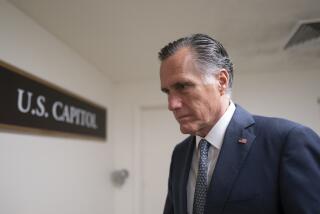For Obama, a ‘team of rivals’; For Romney, debate and rebuttal
Mitt Romney and Barack Obama don’t agree on much these days in their battle for the White House, but they have displayed some similar traits — their reserve, their cool, cerebral approach to problems and their preference for a deliberative decision-making process with the help of a team willing to challenge their views.
When Obama was running for the White House in 2008, he told reporters that he drew inspiration from Doris Kearns Goodwin’s biography of Abraham Lincoln, “Team of Rivals.”
He admired Lincoln’s tendency to seek clashing opinions and said he would conduct his own search for pragmatic people by “casting a wide net, seeking out people with a wide range of expertise, including Republicans.” The lesson from studying Lincoln, Obama told Time magazine’s Joe Klein in 2008, “is to not let your ego or grudges get in the way of hiring absolutely the best people.”
Romney, a former business consultant who led the private equity firm Bain Capital for 15 years, is known as a voracious reader who is famously data-driven. When he makes important decisions, the former Massachusetts governor told C-SPAN during an interview this weekend, he begins by asking “a number of people close to the area of subject to come in and present their views.”
“I like having debate, I like having two sides. You know, I did go to law school; I didn’t practice law but I did go to law school,” Romney said. “I like the idea of arguing points back and forth, and sorting through them and being able to probe with them.”
He said it was important to gather data and information “so that you don’t just have people expressing their opinions, but you actually have numbers, and facts, and figures, and people to look to and find out what’s really happening.”
At the end of that process, he continued, “I don’t mind whether I’m all alone or whether the people in the room agree with me or not, you make the decision based upon what you feel is best.”
When shaping policy in the Middle East, for example, Romney said he would seek guidance from former officials in Democratic and Republican administrations “people, by the way, with whom I might have disagreement.”
“I’d love to have them in a room where we debate different alternatives,” he said. As long as there is time for that kind of a deliberative process, he said, “you really want to understand all the possible downsides.”
Follow Politics Now on Twitter
More to Read
Get the L.A. Times Politics newsletter
Deeply reported insights into legislation, politics and policy from Sacramento, Washington and beyond. In your inbox three times per week.
You may occasionally receive promotional content from the Los Angeles Times.











